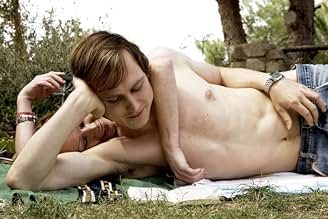VALUTAZIONE IMDb
6,6/10
4224
LA TUA VALUTAZIONE
Aggiungi una trama nella tua linguaWhile on a Mediterranean vacation, a seemingly happy boyfriend and girlfriend find their connection to one another tested as they bond with another couple.While on a Mediterranean vacation, a seemingly happy boyfriend and girlfriend find their connection to one another tested as they bond with another couple.While on a Mediterranean vacation, a seemingly happy boyfriend and girlfriend find their connection to one another tested as they bond with another couple.
- Regia
- Sceneggiatura
- Star
- Premi
- 7 vittorie e 19 candidature totali
Recensioni in evidenza
Maren Ade has set a German "Kammerspiel" in sunny Sardinia; a Dogma-looking, Eric Rohmer-inspired account of a young couple on vacation in a big, beautiful house - and their reluctant, but increasingly blatant attempts at penetrating each other's bodies and souls. She loves him. Does he love her?
"Alle Anderen" is not pitch-perfect (and has been received with varied reactions - from a posh Jury Grand Prix in Berlin '09 to fairly feeble reviews). Indeed, it's a bit too long for its own good and strangely uneven at times. But at one point, you just surrender to the subtle narrative and the complex, fully fleshed out characters (needless to say, Birgit Minichmayr and Lars Eidinger are phenomenal in the leads. Their performances look so simple, so easy-to-pull-off).
Maren Ade has accomplished the difficult stunt of putting the audience in the very same room, at the same intense wave-length, as these searching, anxious people. She allows us to eavesdrop to cunning conversations, to witness a constant (if not always visible) emotional struggle. And she keeps a shrewd surprise for the very end, suddenly pulling the rug from under our feet, forcing us to re-evaluate everything we've seen and heard up until this point.
The sound of silence can be damaging. Tears and laughter can be emancipating. Because in the end, it's all about love.
"Alle Anderen" is not pitch-perfect (and has been received with varied reactions - from a posh Jury Grand Prix in Berlin '09 to fairly feeble reviews). Indeed, it's a bit too long for its own good and strangely uneven at times. But at one point, you just surrender to the subtle narrative and the complex, fully fleshed out characters (needless to say, Birgit Minichmayr and Lars Eidinger are phenomenal in the leads. Their performances look so simple, so easy-to-pull-off).
Maren Ade has accomplished the difficult stunt of putting the audience in the very same room, at the same intense wave-length, as these searching, anxious people. She allows us to eavesdrop to cunning conversations, to witness a constant (if not always visible) emotional struggle. And she keeps a shrewd surprise for the very end, suddenly pulling the rug from under our feet, forcing us to re-evaluate everything we've seen and heard up until this point.
The sound of silence can be damaging. Tears and laughter can be emancipating. Because in the end, it's all about love.
A very realistic tale about two people living on different frequencies and the shame and misunderstanding about and with the people you intend to be the nearest with. Told in front of a beautiful setting by breathtakingly great but unagitated and subtle actors. One of the must-see German films.
Ade has that rare gift (taken to it's peak by filmmakers like Eric Rohmer and more recently Nicole Holofcener) of showing all the things movies usually don't. The little things, the subtle moments in a relationship that make up 98% of the time in real life, that lead to that dramatic 2% we usually watch on screen.
The story is about a couple in their early 30s, and not far into their relationship, taking a vacation and in the process slowly discovering each other in relation to each other and the world. Indeed the only brief moments the film feels false are when the biggest drama erupts. But for the vast majority of the time, thanks to wonderful performances by the two leads and Ade's seemingly casual, but very specific use of the camera, it feels like we are seeing the subtle, complex, confusing truth of a relationship, warts and all, in a way that's very rare on screen.
The story is about a couple in their early 30s, and not far into their relationship, taking a vacation and in the process slowly discovering each other in relation to each other and the world. Indeed the only brief moments the film feels false are when the biggest drama erupts. But for the vast majority of the time, thanks to wonderful performances by the two leads and Ade's seemingly casual, but very specific use of the camera, it feels like we are seeing the subtle, complex, confusing truth of a relationship, warts and all, in a way that's very rare on screen.
Similar in style and tone to last year's "Blue Valentine," the German film "Everyone Else" provides us with an oblique look at a troubled relationship. Though the couple in this film does not seem as overtly unhappy as the one in the American work, there is still something clearly eating away at their relationship. The most admirable aspect of the screenplay by Maren Ade is that it doesn't throw easy labels onto either the characters or the problems they're facing. The movie is really more a piece of objective reportage chronicling their lives over the course of a few days than a plot- and theme-driven narrative leading us to a preordained conclusion about them as people.
Chris (Lars Eidinger) is a gifted but apparently not very successful architect, while Gitti (Birgit Minichmayr), his girlfriend, who works in the recording business, seems to be generally supportive of his efforts. Chris and Gitti are spending a relaxing vacation at his mother's home on the Mediterranean, when Gitti begins to off-handedly question Chris's masculinity (we assume that it has more to do with his lack of initiative and drive than with his personal mannerisms). In response, Chris begins to treat Gitti in an ever more callous fashion, trying to prove her wrong by acting in the dismissive and domineering way he assumes "real" men do, and in the way, if Gitta is any indication, women apparently want them to.
But this synopsis really only covers the tip of the iceberg, for there are clearly many more complex dynamics taking place within this relationship that are not so easily delineated and described. Suffice it to say that the movie explores the myriad elements that go into relationships, and does so without spelling them out in simplistic terms and without passing judgment on the characters. The parameters within which any relationship must be set are still evolving and fluid in the case of Chris and Gitti, and this leads to much pushing of the boundaries and behavioral experimentation on the part of the couple throughout the course of the film. Ade's direction is unobtrusive and observational in nature, which allows the actors to interact with one another in a quasi-improvisational and thus wholly believable fashion.
There is, however, a definite downside to this type of storytelling – "Blue Valentine" suffered from it as well – and that is that the motivations for the characters' actions are often so murky and inexplicable that they can seem downright arbitrary to those of us who are watching all of this unfold from the outside in. That's why Chris and Gitti strike us as being more weird and annoying – if not downright daffy - than anything else at times.
Thus, your initial response might be to assume that perhaps Chris and Gitti simply aren't meant for one another and that they might think about looking elsewhere for a relationship. But, then again, if it were that easy to get out of a troubled relationship, we'd have no need in the first place for films like "Everyone Else."
Chris (Lars Eidinger) is a gifted but apparently not very successful architect, while Gitti (Birgit Minichmayr), his girlfriend, who works in the recording business, seems to be generally supportive of his efforts. Chris and Gitti are spending a relaxing vacation at his mother's home on the Mediterranean, when Gitti begins to off-handedly question Chris's masculinity (we assume that it has more to do with his lack of initiative and drive than with his personal mannerisms). In response, Chris begins to treat Gitti in an ever more callous fashion, trying to prove her wrong by acting in the dismissive and domineering way he assumes "real" men do, and in the way, if Gitta is any indication, women apparently want them to.
But this synopsis really only covers the tip of the iceberg, for there are clearly many more complex dynamics taking place within this relationship that are not so easily delineated and described. Suffice it to say that the movie explores the myriad elements that go into relationships, and does so without spelling them out in simplistic terms and without passing judgment on the characters. The parameters within which any relationship must be set are still evolving and fluid in the case of Chris and Gitti, and this leads to much pushing of the boundaries and behavioral experimentation on the part of the couple throughout the course of the film. Ade's direction is unobtrusive and observational in nature, which allows the actors to interact with one another in a quasi-improvisational and thus wholly believable fashion.
There is, however, a definite downside to this type of storytelling – "Blue Valentine" suffered from it as well – and that is that the motivations for the characters' actions are often so murky and inexplicable that they can seem downright arbitrary to those of us who are watching all of this unfold from the outside in. That's why Chris and Gitti strike us as being more weird and annoying – if not downright daffy - than anything else at times.
Thus, your initial response might be to assume that perhaps Chris and Gitti simply aren't meant for one another and that they might think about looking elsewhere for a relationship. But, then again, if it were that easy to get out of a troubled relationship, we'd have no need in the first place for films like "Everyone Else."
great actors, smart dialogs and a very precise observations of a young professional society in Germany. one of the best German films in a long time made by a director who knows how to direct great actors. people who like theatre will love this movie. when i went to this movie i expected a German version of a french movie from directors like francois ozon. i also expected it to be a typical movie made from a woman for women. still i expected a lot because the actors count to the best ones of German theatre. the movie did not turn out the way i expected it. the questions it raises about creative achievers who want to stay independent, free and young are shameless and razor sharp. every scene is observed very precisely without seeming to be constructed. gitty (birgit minichmayr) might not be as strong as many might hope but she never looses the main focus of this movie: authenticity
Lo sapevi?
- Colonne sonoreTo All The Girls I've Loved Before
Written by Albert Hammond and Hal David
Performed by Julio Iglesias and Willie Nelson
I più visti
Accedi per valutare e creare un elenco di titoli salvati per ottenere consigli personalizzati
- How long is Everyone Else?Powered by Alexa
Dettagli
- Data di uscita
- Paese di origine
- Siti ufficiali
- Lingue
- Celebre anche come
- Everyone Else
- Luoghi delle riprese
- Aziende produttrici
- Vedi altri crediti dell’azienda su IMDbPro
Botteghino
- Lordo Stati Uniti e Canada
- 102.042 USD
- Fine settimana di apertura Stati Uniti e Canada
- 10.810 USD
- 11 apr 2010
- Lordo in tutto il mondo
- 2.634.462 USD
- Tempo di esecuzione
- 1h 59min(119 min)
- Colore
- Mix di suoni
- Proporzioni
- 1.85 : 1
Contribuisci a questa pagina
Suggerisci una modifica o aggiungi i contenuti mancanti
























